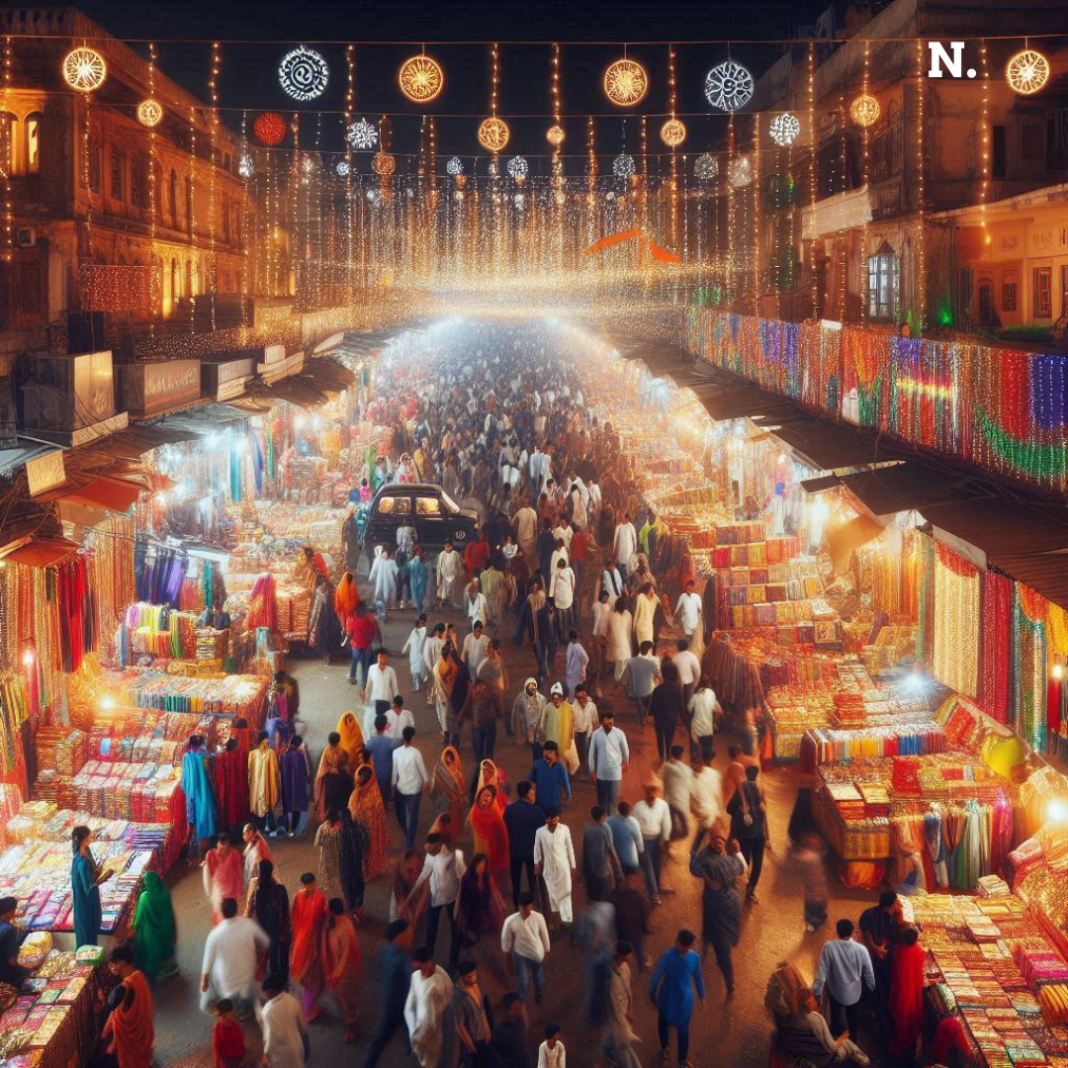The Diwali season in India lights up more than just homes and streets; it ignites the economy in ways that reach every corner of the country. From record-breaking sales in e-commerce to an increase in gold demand, Diwali has an impact that goes beyond celebrations. Known as the festival of lights, Diwali boosts consumer spending and drives India’s economic engine through multiple sectors. Here’s a look at the ripple effect of Diwali on India’s economy this year.
The Diwali Economy in Numbers
Diwali’s influence on the economy is immense, becoming a season of financial activity almost as much as festivity. The Confederation of All India Traders (CAIT) reported that traders earned ₹3.75 lakh crore during the Diwali season last year. They anticipate this amount will skyrocket to ₹4.25 lakh crore nationwide in 2024. In Delhi alone, they expect the festive business to exceed ₹75,000 crore this year.
This surge comes from multiple sources:
- Consumer Spending: Diwali sparks purchases in everything from electronics to clothing, leading to significant spending across categories.
- Corporate Bonuses: Many companies give out bonuses to their employees, who then put that money back into the economy by purchasing goods, boosting market liquidity.
- Real Estate: Property transactions tend to rise during Diwali as it’s seen as a lucky time to buy property, contributing significantly to the real estate market.
- Stock Market Activity: Muhurat trading, a one-hour trading session held on Diwali, generates both economic activity and optimism, reflecting the festival’s financial influence.
When comparing Diwali’s economic impact globally, it may not reach the numbers seen during China’s Spring Festival or the U.S. Christmas shopping season. However, Diwali continues to grow each year, strengthening India’s festive economy.
Diwali’s Retail Frenzy
Retail is one of the biggest beneficiaries of Diwali’s economic impact, with consumers eager to shop for everything from clothes to gadgets to home goods. E-commerce sites had a spectacular start to their Diwali sales this year. In the first week alone, goods worth approximately ₹55,000 crore, or about $6.5 billion, were sold online—a 26% increase from last year. The shopping excitement of the season is predicted to be highlighted by the projected ₹120,000 crore in total holiday sales for 2024.
This retail boom is not limited to major cities. Demand from Tier II cities and smaller regions has grown remarkably. Platforms like Meesho report that nearly 45% of their buyers come from these areas. Additionally, the popularity of quick-commerce services means consumers can receive their orders around the clock, even for late-night purchases, helping to meet the festive demand. Consumers are also opting for items with higher price tags, often using EMI (Equated Monthly Installments) payment options to manage their budgets.
Gold and Jewelry: High Prices, Changing Trends
For many Indians, Diwali is synonymous with buying gold—a tradition that symbolizes good fortune and wealth. However, the gold market is facing a unique challenge this year. Although India remains the second-largest gold buyer in the world, experts anticipate a 12-15% drop in Diwali gold purchases due to high prices. Gold prices in India have hit record highs, with the MCX gold rate reaching ₹77,800 per 10 grams, a 25% increase from the previous year.
Despite the rising prices, the Diwali gold market isn’t slowing down entirely. Buyers are shifting to lighter, more practical jewelry designs to keep within budget. This reflects a change in consumer choices driven by both financial considerations and modern style preferences. An interesting trend in this space is the digital shift. Younger investors, who prefer convenience, are exploring alternatives like gold ETFs (Exchange-Traded Funds) and digital gold, which can be bought and sold easily.
For perspective, gold ETFs in India now hold assets worth approximately ₹39,824 crore as of September 2024. These funds, which invest in 99.5% pure gold bullion, allow investors to track the price of gold and choose from 17 gold ETFs across the country. This trend towards digital investments is slowly changing how Indians engage with the gold market.
Diwali and the Real Estate Rush
Diwali is a time when India’s real estate market also experiences a significant boost. Tradition meets opportunity as property developers launch festive offers, drawing in potential buyers with attractive perks. This season, developers have added creative deals to attract buyers, such as offering complimentary parking spaces, GST waivers, and even luxury items like gold coins or cars with property purchases.
In Delhi-NCR, residential projects worth ₹1 lakh crore are expected to be launched this season. Real estate firms are optimistic despite a recent dip in housing sales during the previous quarter (July-September 2024). One reason for this positive outlook is the timing of Diwali with year-end bonuses, which often helps buyers manage down payments for property purchases. This season also provides a financial checkpoint, with half the year behind, giving buyers a clearer view of their financial goals.
Automobiles and Diwali
Diwali is considered an auspicious time for major purchases, and the automobile sector sees a tremendous increase in demand during this period. Around 30% of annual car sales happen during Diwali, with automakers offering enticing discounts to boost sales. In 2024, these discounts are expected to be even more substantial, given that many companies are sitting on high inventories. This season, the top car manufacturers are offering up to ₹2 lakh discounts on popular models, as inventories stand at 790,000 vehicles valued at ₹79,000 crore.
As a result, car dealerships across India report a significant increase in foot traffic and booking inquiries. Compared to previous months, inquiries and bookings have risen by 3-4 times, reflecting the festive demand for new vehicles. Dealerships have observed a notable rise in visits just in the first week of October, showcasing how deeply intertwined Diwali and the automobile sector have become.
Sweets Industry and Diwali
For Indian households, Diwali wouldn’t be complete without sweets. Whether for gifting or personal enjoyment, sweets hold a central place in the celebrations. In fact, many sweet shops generate about 30-35% of their annual revenue during the Diwali period, underscoring the festival’s role in the industry.
As millions of households stock up on traditional sweets and treats, sweet shops are operating at full capacity to meet the seasonal demand. This tradition also supports small businesses across the country, with both local and large-scale sweet manufacturers playing an essential role in spreading Diwali cheer.
The Muhurat Trading Effect on Stock Markets
In addition to retail and real estate, Diwali also impacts the stock market through the practice of Muhurat trading. This one-hour special trading session has been a tradition since 1957. It is considered an auspicious way to begin the Hindu financial year. While mostly symbolic, Muhurat trading generally brings a “positive bias.” Many investors focus on buy orders, aiming to start the year with a prosperous trade.
Statistics show that Muhurat trading typically closes on a positive note. The BSE Sensex ended higher in 13 out of the past 17 sessions. This includes a gain of 355 points in 2023. However, the initial positivity often fades, with the index declining in 7 of the past 11 years following Muhurat trading.
Diwali’s impact on India’s economy spans far and wide. The festival spreads joy and prosperity throughout the country. It also acts as a powerful economic force, influencing multiple sectors. Businesses across India benefit greatly from Diwali’s impact. From cars to gold to sweets, Diwali lights up not just homes but entire industries.





